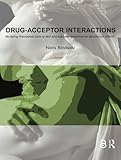Drug-acceptor interactions : modeling theoretical tools to test and evaluate experimental equilibrium effects / Niels Bindslev, Department of Biomedical Sciences, Faculty of Health Sciences, University of Copenhagen.
Material type: TextPublisher: London : Routledge, 2017Copyright date: ©2008Description: 1 online resource (xviii, 410 pages) : illustrations (some color)Content type:
TextPublisher: London : Routledge, 2017Copyright date: ©2008Description: 1 online resource (xviii, 410 pages) : illustrations (some color)Content type: - text
- computer
- online resource
- 1351660586
- 9781351660570
- 1351660578
- 9781351660587
- 9781315159782
- 1315159783
- 9781351660563
- 135166056X
- 615.7045 23
Online resource; title from PDF title page (EBSCO, viewed June 28, 2021).
Part 1. One-state models : simple agonism and ant-agonism -- part 2. Two-state models : complex agonism and modulation -- part 3. Test of tools for data analysis -- part 4. Biological regulation and allostery.
Includes bibliographical references.
Drug-Acceptor Interactions: Modeling theoretical tools to test and evaluate experimental equilibrium effects suggests novel theoretical tools to test and evaluate drug interactions seen with combinatorial drug therapy. The book provides an in-depth, yet controversial, exploration of existing tools for analysis of dose-response studies at equilibrium or steady state. The book is recommended reading for post-graduate students and researchers engaged in the study of systems biology, networks, and the pharmacodynamics of natural or industrial drugs, as well as for medical clinicians interested in drug application and combinatorial drug therapy. Even people without mathematical skills will be able to follow the pros and cons of reaction schemes and their related distribution equations. Chapter 9 is a hands-on guide for software to plot, fit and analyze one's own data.
Master record variable field(s) change: 050

There are no comments on this title.